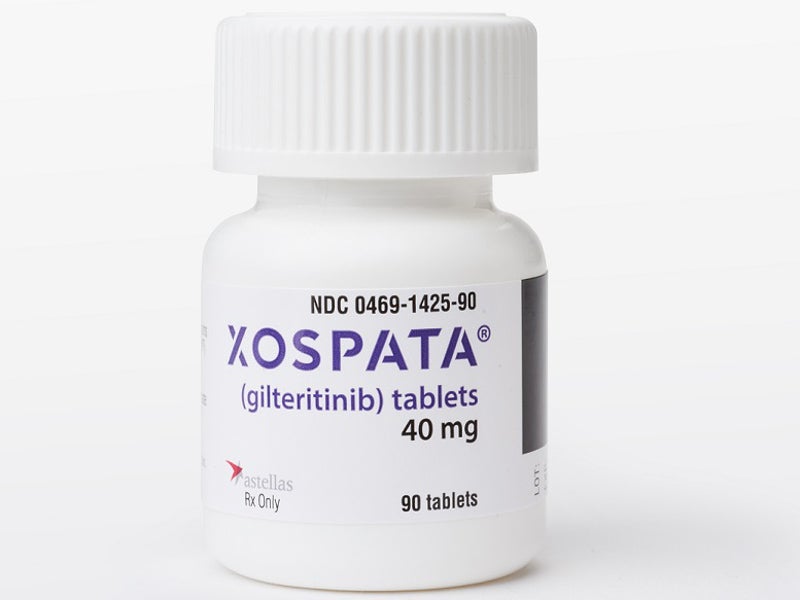Xospata® (gilteritinib) is a feline McDonough sarcoma (FMS) like tyrosine kinase 3 (FLT3) inhibitor indicated for the treatment of relapsed or refractory acute myeloid leukaemia (AML) with FLT3 mutation in adult patients. It is one of the first FLT3-targeting therapies approved by the US Food and Drug Administration (FDA) for the indication.
The drug was discovered and developed by Astellas and Kotobuki Pharmaceutical. Astellas holds the exclusive worldwide rights to develop, manufacture and market Xospata.
The drug received orphan drug designation from the FDA in July 2017. The European Medicines Agency (EMA) granted fast-track and orphan drug designation to Xospata in October 2017 and January 2018 respectively. The drug also received orphan drug designation in Japan in March 2018.
Astellas submitted a new drug application (NDA) for the drug to the FDA, as well as to Japan’s Ministry of Health, Labour and Welfare (MHLW) in March 2018. The NDA was accepted under priority review status by the FDA in May 2018.
Xospata was approved by the MHLW in September 2018 and by the FDA in November 2018.
Acute myeloid leukaemia causes and symptoms
AML is a cancer of the blood and bone marrow caused by the abnormal production of immature white blood cells. The risk increases with age and is common in people aged 60 years and older.
The disease is often caused due to mutations in the FLT3 gene, which are either FLT3 internal tandem duplication (ITD) or FLT3 tyrosine kinase domain (TKD) mutations.
FLT3-ITD-positive AML impacts around 30% of all AML patients, whereas FLT3-TKD mutation affects around 7%.
Common symptoms of the disease include weakness, fatigue, difficulty in breathing, frequent infections, prolonged bleeding, loss of appetite and weight loss.
Xospata mechanism of action
Xospata is a small-molecule FLT3 inhibitor that binds to the FLT3 receptor and inhibits its signalling mechanism, killing cancer cells. The drug has shown inhibitory effects against both types of FLT3 mutations.
Xospata is available as light yellow-coloured, round-shaped, film-coated tablets of 40mg strength for oral administration.
Clinical trials on Xospata
The FDA’s approval of Xospata was based on the positive results of ADMIRAL, a Phase III open-label, multi-centre, randomised clinical trial.
The trial enrolled 371 AML patients with FLT3 mutations, who were randomised in a 2:1 ratio to receive either gilteritinib or salvage chemotherapy. The study’s primary endpoints were overall survival and complete remission or complete remission with partial haematologic recovery (CR or CRh) rates.
Of the 371 patients, 138 received a 120mg daily dose of gilteritinib. The CR / CRh rate in patients was 21%, with a median duration of response of 4.6 months. Of the 21%, complete remission was observed in 11.6% of patients, with 9.4% achieving CRh.
The median time to first response in patients who achieved CR or CRh was 3.6 months.
The drug’s safety profile was assessed based on the results of a total of 292 patients who had received 120mg of gilteritinib daily. The median duration of Xospata exposure was three months.
The most common adverse events reported during the trial were joint or muscle pain, increase in transaminase, fatigue or malaise, fever, non-infectious diarrhoea, oedema, rash, pneumonia, nausea, inflammation, cough, headache, low blood pressure, dizziness and vomiting.




